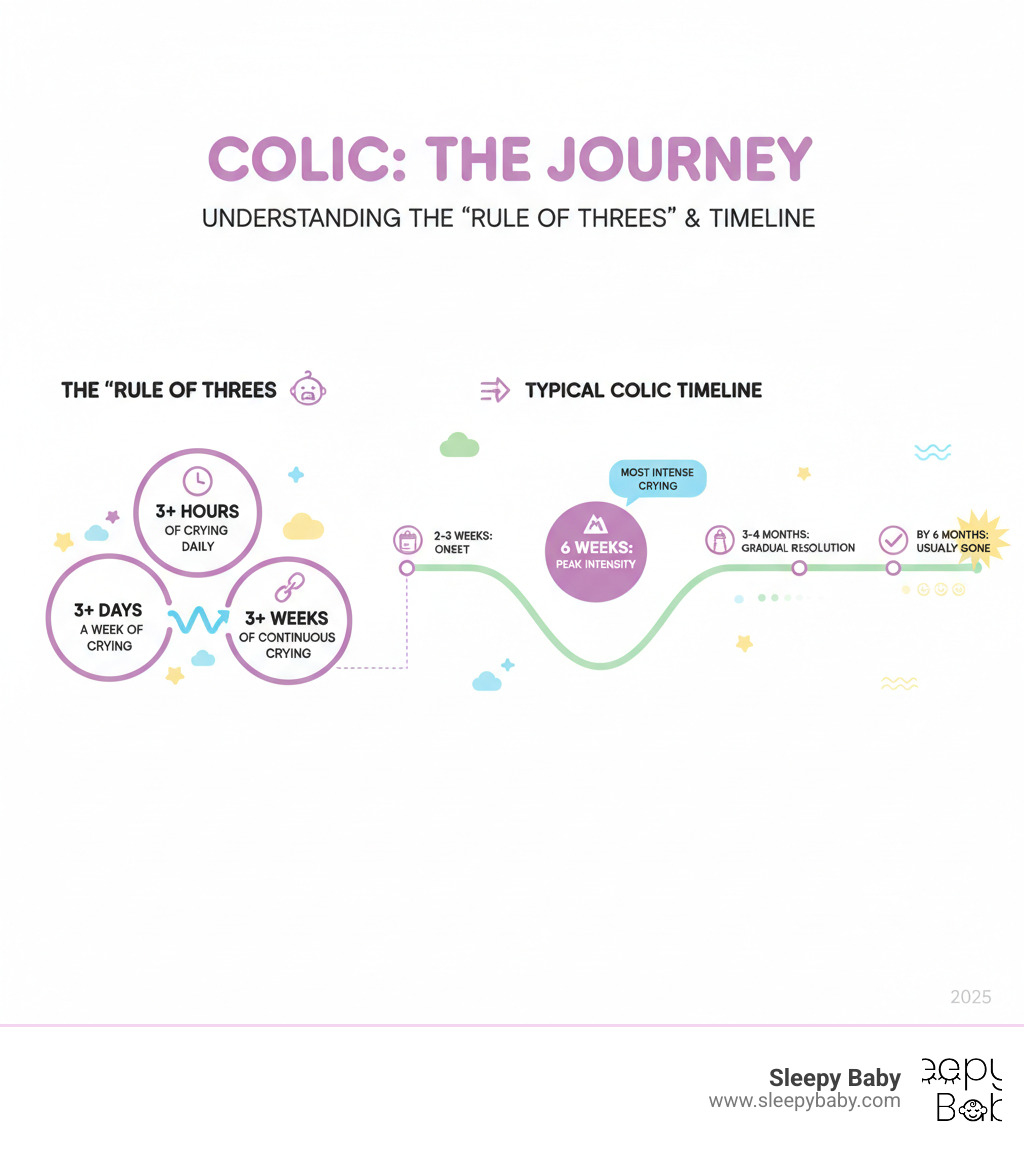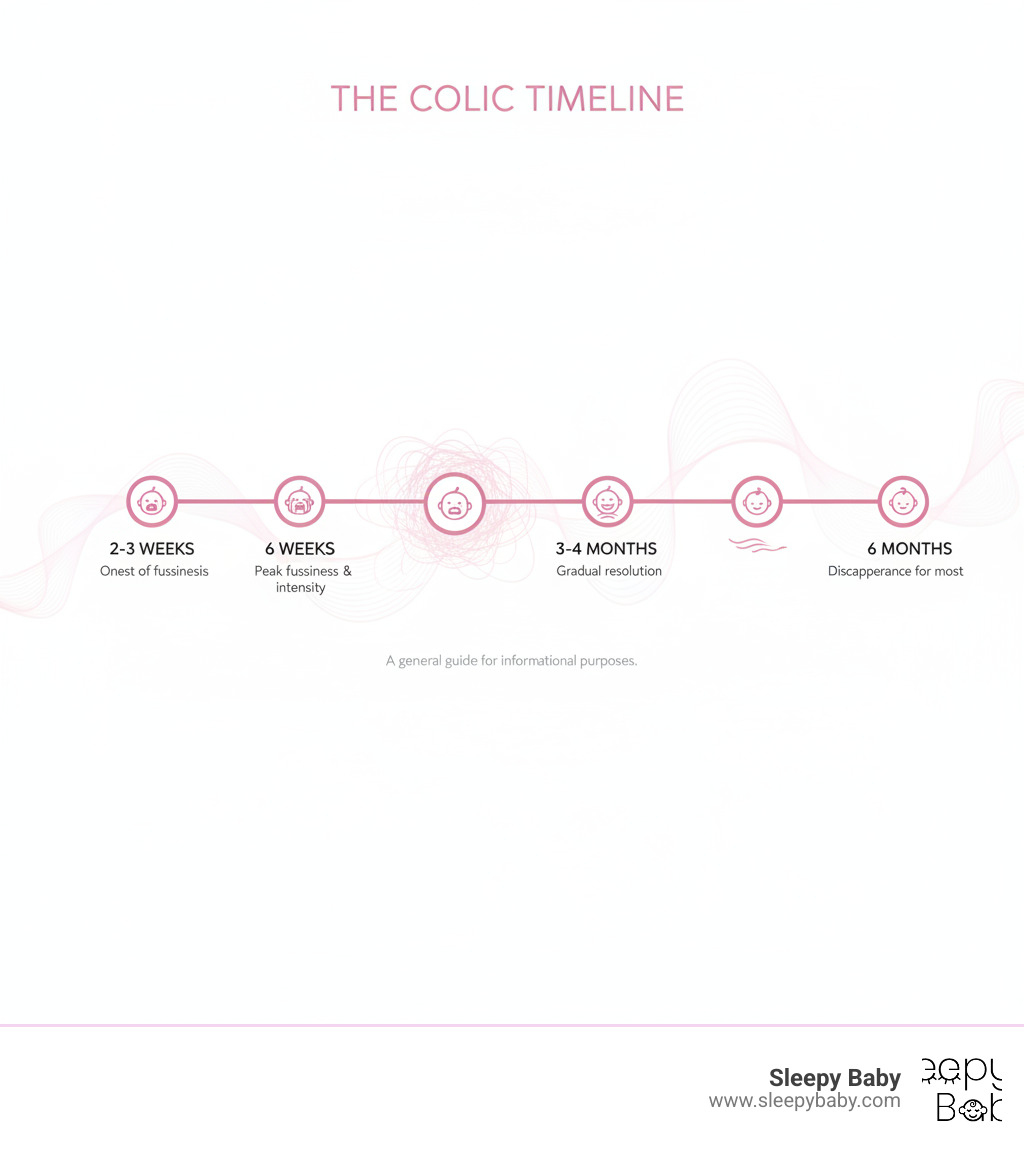When Colic Finally Comes to an End
When does baby colic go away is one of the most searched questions by exhausted parents desperately seeking hope. The good news? Colic has a predictable end.
Quick Answer:
- Most babies: Colic resolves by 3-4 months of age
- Peak intensity: Around 6 weeks old
- Typical onset: 2-3 weeks of age
- Maximum duration: Usually gone by 6 months
- The pattern: Often stops suddenly or gradually improves
If you're reading this at 2 AM while your baby screams inconsolably, you're not alone. Colic affects up to 25% of all babies - that's 1 in 4 families going through exactly what you're experiencing right now.
The constant crying feels endless. Your nerves are frayed. You've tried everything, and nothing seems to work for more than a few minutes.
But here's what you need to know: colic is temporary. It's not caused by anything you did wrong. It's not a reflection of your parenting skills. And most importantly, it will end.
Colic typically follows what doctors call the "Rule of Threes" - crying for more than 3 hours a day, more than 3 days a week, for more than 3 weeks. While those numbers might sound overwhelming, they also give us a roadmap for when relief is coming.
As Gary Harutyunyan, I understand the desperation of when does baby colic go away because I lived through sleepless nights with my own colicky newborn, which ultimately led me to create solutions that help families find peace during this challenging phase. My experience as both a parent and inventor has has shown me that while we wait for colic to naturally resolve, the right tools can make this journey much more manageable.

Similar topics to when does baby colic go away:
- colic in infants meaning (https://www.sleepybaby.com/blogs/our-blog/the-colic-chronicles-understanding-your-infants-unstoppable-tears)
- colic pain (https://www.sleepybaby.com/blogs/our-blog/from-discomfort-to-relief-a-guide-to-colicky-pain)
- colic relief for infants (https://www.sleepybaby.com/blogs/our-blog/infant-colic-relief-tips-and-tricks-for-exhausted-parents)
What is Colic? Recognizing the Unmistakable Signs
If you've been wondering when does baby colic go away, you first need to understand what you're dealing with. Colic isn't a disease or something you caused - it's simply a phase that many healthy babies go through during their first few months of life.
The medical definition follows what doctors call the "Rule of Threes": crying for more than three hours a day, at least three days a week, for more than three consecutive weeks. But as any parent living through it knows, those numbers don't capture the emotional toll of holding your screaming baby at 3 AM, feeling completely helpless.
Here's what makes colic particularly challenging: your baby is otherwise completely healthy. They're eating well, gaining weight, and developing normally. But during those crying episodes, they seem to be in genuine distress, and nothing you try seems to help.
The crying often follows a predictable pattern, typically striking in the late afternoon or evening. Parents have dubbed this the "witching hour" - that time when your previously content baby suddenly transforms into an inconsolable little person. Understanding these patterns can help you prepare and cope better during this difficult phase.
For a deeper dive into identifying these challenging moments, check out The Crying Game: Recognizing Colic Symptoms in Babies (https://www.sleepybaby.com/blogs/our-blog/the-crying-game-recognizing-colic-symptoms-in-babies).
The Difference Between Normal Crying and Colic

Every baby cries - it's how they tell us they need something. Normal crying usually has a clear purpose: hunger, a dirty diaper, tiredness, or simply wanting to be held. Once you address the need, the crying stops. It's like a conversation where your baby tells you what they want, and you respond.
Colic crying is completely different. It's like your baby is speaking a language you don't understand, no matter how hard you try.
The sound itself is distinct - high-pitched, intense, and often described as piercing. It comes on suddenly, sometimes in the middle of what seemed like a perfectly content moment. Your baby might have just finished eating and seemed happy, then suddenly erupts into inconsolable crying.
During these episodes, you'll notice physical signs that set colic apart from regular fussiness. Your baby's face becomes red and flushed, their little fists clench tightly, and their whole body tenses up. They might arch their back as if trying to escape some invisible discomfort, or curl their legs up toward their belly. Sometimes they'll pass gas, which might bring a moment of relief before the crying starts again.
What makes colic so frustrating is that there's no clear reason for the crying. You've checked everything - diaper is clean, they just ate, they're not too hot or cold - yet the crying continues for what feels like hours.
How Doctors Diagnose Colic
When you finally make that appointment with your pediatrician (probably after several sleepless nights), they won't run a specific test for colic. Instead, they'll work like a detective to make sure nothing else is causing your baby's distress.
Your doctor will start with a thorough physical exam, checking your baby from head to toe. They're looking for signs of conditions that could cause pain or discomfort - things like hernias, infections, or gastroesophageal reflux disease (GERD).
They'll also ask detailed questions about the crying patterns. This is where keeping a crying journal becomes incredibly helpful. When does the crying usually start? How long does it last? What seems to help, even temporarily? What makes it worse?
The doctor needs to rule out food allergies or sensitivities, particularly to cow's milk protein in formula or passed through breast milk. They'll also check for less obvious problems that can cause crying, like a hair wrapped tightly around a tiny finger or toe.
According to the Mayo Clinic, this process of elimination is crucial. Only after ensuring your baby is otherwise healthy and the crying pattern fits the Rule of Threes will your pediatrician diagnose colic.
The good news? Once you have a diagnosis, you're one step closer to understanding when does baby colic go away - and knowing that this challenging phase has a predictable end.
The Colic Timeline: When Does Baby Colic Go Away?
The million-dollar question for every parent navigating the colicky phase is: when does baby colic go away? The good news is that colic follows a predictable pattern, and understanding this timeline can be your lifeline during those overwhelming moments.

Think of colic like a storm that builds, peaks, and then gradually clears. For most babies, this journey begins around 2 to 4 weeks of age. If your baby was born early, you might notice the onset happening a bit later, as premature babies often follow their adjusted age rather than their birth age.
The intensity typically reaches its peak around 6 weeks old. This is when many parents feel like they're drowning in tears (both baby's and their own). The crying might seem endless, and nothing you try seems to work. If you're in this phase right now, please know that you're at the hardest part - it truly does get better from here.
After this peak, most families notice a gradual improvement over the following weeks. Some days might still be rough, but you'll start to see more good moments mixed in with the difficult ones. For some lucky parents, the change happens almost overnight - one day your baby is crying for hours, and the next day they're suddenly calm and content.
When Does Baby Colic Go Away for Most Infants?
Here's the reassurance you've been waiting for: most babies outgrow colic by 3 to 4 months of age. This isn't just wishful thinking - it's backed by medical research and the experiences of countless families who've walked this path before you.
By the time your little one reaches their 3-month milestone, you'll likely notice a dramatic difference. The evening crying spells become shorter and less intense. Your baby starts to have longer periods of contentment during the day. They might even begin to sleep for longer stretches at night.
For some babies, the journey takes a bit longer. A smaller percentage of colicky babies continue having difficult periods until around 6 months. This doesn't mean anything is wrong with your baby or your parenting - some little ones just need more time to mature and regulate their systems.
If your baby was born prematurely, remember to adjust your expectations based on their corrected age rather than their birth date. A baby born two months early might not show improvement until they're 5 or 6 months old, which is perfectly normal.
The most important thing to remember is that colic always has an end date. You can find additional support and strategies at Colic Relief Tips for Parents (https://www.healthychildren.org/English/ages-stages/baby/crying-colic/Pages/Colic.aspx).
Potential Causes and Contributing Factors
The frustrating truth about colic is that doctors still don't know exactly what causes it. This uncertainty can feel maddening when you're desperately searching for answers at 3 AM, but understanding the leading theories can help you feel more informed and less helpless.
The most widely accepted theory involves your baby's immature digestive system. Think about it - your little one spent nine months getting all their nutrition through the umbilical cord, and now they're suddenly learning to process milk through their brand-new digestive tract. Gas pains from swallowing air during crying fits can create a vicious cycle where discomfort leads to more crying, which leads to more gas.
Another leading theory focuses on your baby's developing nervous system. Some babies seem to be more sensitive to the world around them. After spending months in the quiet, dim environment of the womb, the lights, sounds, and sensations of everyday life can feel overwhelming. This overstimulation often explains why colic episodes frequently happen in the late afternoon and evening - your baby has simply reached their limit for processing new experiences.
Food sensitivities play a role for some babies, though they're responsible for less than 5% of colic cases. If you're breastfeeding, certain foods in your diet might pass through your breast milk and upset your baby's stomach. Common culprits include dairy products, caffeine, and gassy vegetables. For formula-fed babies, a sensitivity to cow's milk protein in standard formulas can sometimes contribute to excessive crying.
The reality is that for most colicky babies, it's probably a combination of these factors rather than one single cause. Your baby isn't crying because you're doing anything wrong - they're simply going through a challenging developmental phase that will pass with time.
For more insights into why your baby might be experiencing these intense crying spells, take a look at Why Your Baby Won't Stop Crying (https://www.sleepybaby.com/blogs/our-blog/why-your-baby-wont-stop-crying).
Soothing the Storm: Proven Strategies for Colic Relief
When your baby is deep in a colicky crying spell, you'd try anything - anything - to bring them comfort. While there's no magical instant cure for colic, many proven strategies can help soothe your little one and make this challenging phase more manageable for your entire family.

One of the most effective approaches comes from Dr. Harvey Karp's famous "5 S's" method. These techniques work by recreating the familiar sensations your baby experienced in the womb, where life was cozy, predictable, and comforting.
Swaddling your baby snugly in a blanket provides that secure, womb-like feeling while preventing those startling reflexes that can make crying worse. Think of it as giving your baby a gentle, constant hug when you can't hold them yourself.
The side or stomach position can work wonders during crying episodes. While babies must always sleep on their backs for safety, holding them on their side or stomach during fussy periods - like the classic "colic carry" across your forearm - often brings immediate relief.
Shushing loudly might feel strange at first, but the womb was surprisingly noisy! Your confident "shush" needs to be louder than your baby's crying to cut through their distress. White noise machines can be your backup when your voice gets tired.
Swinging or swaying with gentle, rhythmic motion mimics the constant movement your baby felt when you walked around during pregnancy. Whether it's rocking in a chair, bouncing gently on an exercise ball, or taking a car ride, motion often works like magic.
Finally, sucking on a pacifier, your finger, or during feeding activates your baby's natural calming reflex. It's one of their first and most reliable self-soothing tools.
Beyond the 5 S's, baby wearing keeps your little one close while providing continuous gentle motion. Many parents find that their colicky baby settles completely when worn in a carrier or sling, allowing you to move around and even get things done while providing comfort.
Feeding Adjustments and Home Remedies
Sometimes small changes to feeding routines can make a surprising difference in your baby's comfort level. Frequent burping during and after feeds helps release trapped air that can contribute to discomfort. Try burping every ounce or two during bottle feeding, or when switching breasts.
Upright feeding positions can reduce the amount of air your baby swallows. For bottle feeding, paced feeding - where you control the flow and take breaks - prevents your baby from gulping too quickly and swallowing excess air.
If you're breastfeeding, your pediatrician might suggest temporarily eliminating common trigger foods from your diet, such as dairy, caffeine, or gas-producing vegetables like broccoli or cabbage. Make these changes one at a time so you can actually tell if they help.
For formula-fed babies, your doctor might recommend trying a hypoallergenic formula designed for sensitive tummies. Some studies show these specialized formulas can decrease colic symptoms in certain infants.
Simethicone drops are considered safe and may help break up gas bubbles, though always check with your pediatrician first. Some research also suggests that certain probiotic strains, particularly Lactobacillus reuteri, might offer relief, but discuss this option with your doctor.
Other gentle techniques worth trying include giving your baby a warm bath, massaging their belly in clockwise circles, or simply providing extra skin-to-skin contact. Sometimes a change of scenery - like stepping outside for fresh air - can break the crying cycle.
Modern Sleep Aids for Hands-Free Comfort

When you're wondering when does baby colic go away at 3 AM for the hundredth time, hands-free soothing options become absolutely precious. Modern sleep aids have evolved to provide safe, effective comfort that gives exhausted parents a much-needed break.
White noise devices have come a long way from the basic machines of the past. While some older white noise machines raised safety concerns, today's safety-rated devices are designed to deliver soothing sounds at safe, low-decibel levels. Some innovative options even provide gentle white noise directly on your baby's chest, creating an intimate, womb-like experience without overwhelming their sensitive hearing.
Rhythmic tapping devices represent an exciting advancement in baby soothing technology. These clever gadgets mimic the gentle, consistent patting that caregivers naturally provide, offering that comforting touch without requiring your constant physical presence.
Sleepy Baby's Gentle Dreamer exemplifies this innovation, replicating the rhythmic patting that helps regulate your baby's developing nervous system. The customizable soothing allows you to adjust the rhythm and intensity to find what works best for your unique little one, providing targeted relief during those intense colicky periods.
These modern aids offer consistent, comforting stimuli that can help your baby's immature nervous system find calm. More importantly, they give you precious moments to rest, recharge, or simply take a shower - because taking care of yourself is part of taking care of your baby. For more insights on leveraging technology during this challenging time, check out The Easiest Way to Soothe a Colic Baby (https://www.sleepybaby.com/blogs/our-blog/the-easiest-way-to-soothe-a-colic-baby).
You're Not Alone: Coping with Colic and When to Call a Doctor
Dealing with a colicky baby is honestly one of the toughest challenges we face as parents. The endless crying can leave us feeling completely drained, guilty, and questioning everything we're doing. When does baby colic go away becomes more than just a question - it becomes a desperate plea for hope during those long, difficult nights.
The stress of colic isn't just hard on our baby; it's incredibly hard on us too. Many parents report feelings of helplessness, frustration, and even anger during particularly intense crying episodes. This is completely normal and nothing to feel ashamed about. The constant sleep deprivation and emotional strain can actually increase the risk of postpartum depression, making it even more important to prioritize our own well-being.
Here's what we need to remember: you didn't cause your baby's colic. It's not because you're doing something wrong, and it's not a reflection of your parenting skills. Colic happens to healthy babies with loving, capable parents all the time.
Taking care of yourself during this phase isn't selfish - it's essential. When you feel overwhelmed, it's okay to put your baby down in a safe place like their crib and take a few minutes to collect yourself. Ask family and friends for help, even if it's just someone to hold the baby while you take a shower or a short nap. A rested and emotionally stable parent is better equipped to handle the challenges of colic.
When to Seek Medical Advice
While colic itself is harmless and will resolve on its own, it's always important to have your pediatrician evaluate your baby to rule out any underlying medical conditions. Sometimes what looks like colic might actually be something else that needs treatment.
Knowing when to call your doctor can give you peace of mind and ensure your little one gets the right care. Here's how to tell the difference between typical colic symptoms and signs that warrant immediate medical attention:
| Colic Symptoms | Red Flag Symptoms (Call Doctor Immediately) |
|---|---|
| Intense crying for 3+ hours daily | Fever over 100.4°F (38°C) |
| Crying occurs at predictable times | Projectile or persistent vomiting |
| Baby is otherwise healthy and feeding well | Severe diarrhea or constipation |
| Crying stops eventually | Blood in stools |
| Baby can be soothed temporarily | Significant decrease in movement or activity |
| Normal weight gain continues | High-pitched, shrill crying that sounds different |
| Flushed face and clenched fists during episodes | Refusing to eat or significant feeding difficulties |
| Pulling legs up to belly | Signs of dehydration (fewer wet diapers, dry mouth) |
Trust your parental instincts. If something feels different or wrong, don't hesitate to contact your healthcare provider. You know your baby better than anyone, and if their crying suddenly changes in intensity or character, or if they develop any of the red flag symptoms above, it's time to seek medical advice.
Your pediatrician can also provide additional strategies for managing colic and offer reassurance during this challenging time. They might suggest specific formulas, feeding techniques, or other interventions that could help your particular situation.
Asking for help - whether from your doctor, family, or friends - isn't a sign of weakness. It's exactly what any caring parent would do to ensure their baby gets the best possible care.
You're Not Alone: Coping with Colic and When to Call a Doctor
If you're reading this while bouncing a screaming baby at 3 AM, wondering if you're losing your mind, let me tell you something important: you are not alone, and you are not failing as a parent.
Dealing with a colicky baby ranks among the most challenging experiences any parent can face. The relentless crying creates a perfect storm of parental stress, overwhelming guilt ("What am I doing wrong?"), and bone-deep exhaustion that makes everything feel impossible. Many parents of colicky babies describe feeling helpless, frustrated, or even angry - and yes, sometimes even depressed.
Here's what every parent needs to hear: prolonged infant crying is associated with an increased risk of postpartum depression. This isn't a character flaw or a sign of weakness. It's a normal response to an abnormally stressful situation.
You didn't cause the colic. It's not because you're inexperienced, because you're stressed, or because you're doing anything wrong. Colic happens to babies with the most loving, attentive parents in the world.
During this incredibly difficult phase, protecting your own mental and physical well-being becomes just as important as soothing your baby. Taking breaks isn't selfish - it's essential. Asking for help from trusted family and friends isn't admitting defeat - it's being smart. And allowing yourself to step away when you feel overwhelmed isn't giving up - it's preventing burnout.
Put your baby in a safe place like their crib, step into another room, and take five deep breaths. Your baby will be okay for a few minutes, and you'll return as a more centered parent. A refreshed parent is a better parent.
If you don't have nearby family or friends to help, don't hesitate to reach out to your healthcare provider. They can connect you with resources, support groups, or even temporary childcare assistance. Asking for professional help during this overwhelming phase shows strength, not weakness.
When to Seek Medical Advice
While colic is generally harmless and when does baby colic go away naturally by 3-4 months, it's always wise to consult your pediatrician. They need to rule out any other medical conditions that could be causing your baby's excessive crying. Think of it as getting peace of mind along with professional guidance.
More importantly, certain "red flag" symptoms warrant immediate medical attention. These signs indicate something more serious than typical colic and require prompt evaluation.
Here's how to tell the difference between normal colic symptoms and concerning signs that need immediate medical care:
| Colic Symptoms | Red Flag Symptoms (Call Doctor Immediately) |
|---|---|
| Intense, prolonged crying (3+ hours/day, 3+ days/week, 3+ weeks) | Fever (rectal temperature 100.4°F/38°C or higher) |
| Crying episodes that start and stop predictably | Persistent vomiting (not just normal spit-up) |
| Baby is otherwise healthy, eating well, gaining weight | Diarrhea or bloody stools |
| High-pitched crying that seems inconsolable | Decreased movement or unusual lethargy |
| Body tension during crying (clenched fists, arched back) | Sudden change in crying pattern or intensity |
| Baby can be soothed occasionally, even if briefly | Signs of dehydration (fewer wet diapers, sunken eyes) |
Trust your parental instincts. You know your baby better than anyone else. If something feels different or wrong, don't hesitate to call your pediatrician. They'd rather see a worried parent with a healthy baby than miss something important.
The key difference is that with colic, despite the intense crying, your baby is generally healthy, eating well, and growing normally. Red flag symptoms, on the other hand, often come with other signs of illness or distress that feel distinctly different from typical colicky behavior.
Most pediatricians are very familiar with colic and the stress it places on families. They understand your exhaustion and frustration, and they're there to support you through this challenging phase.



